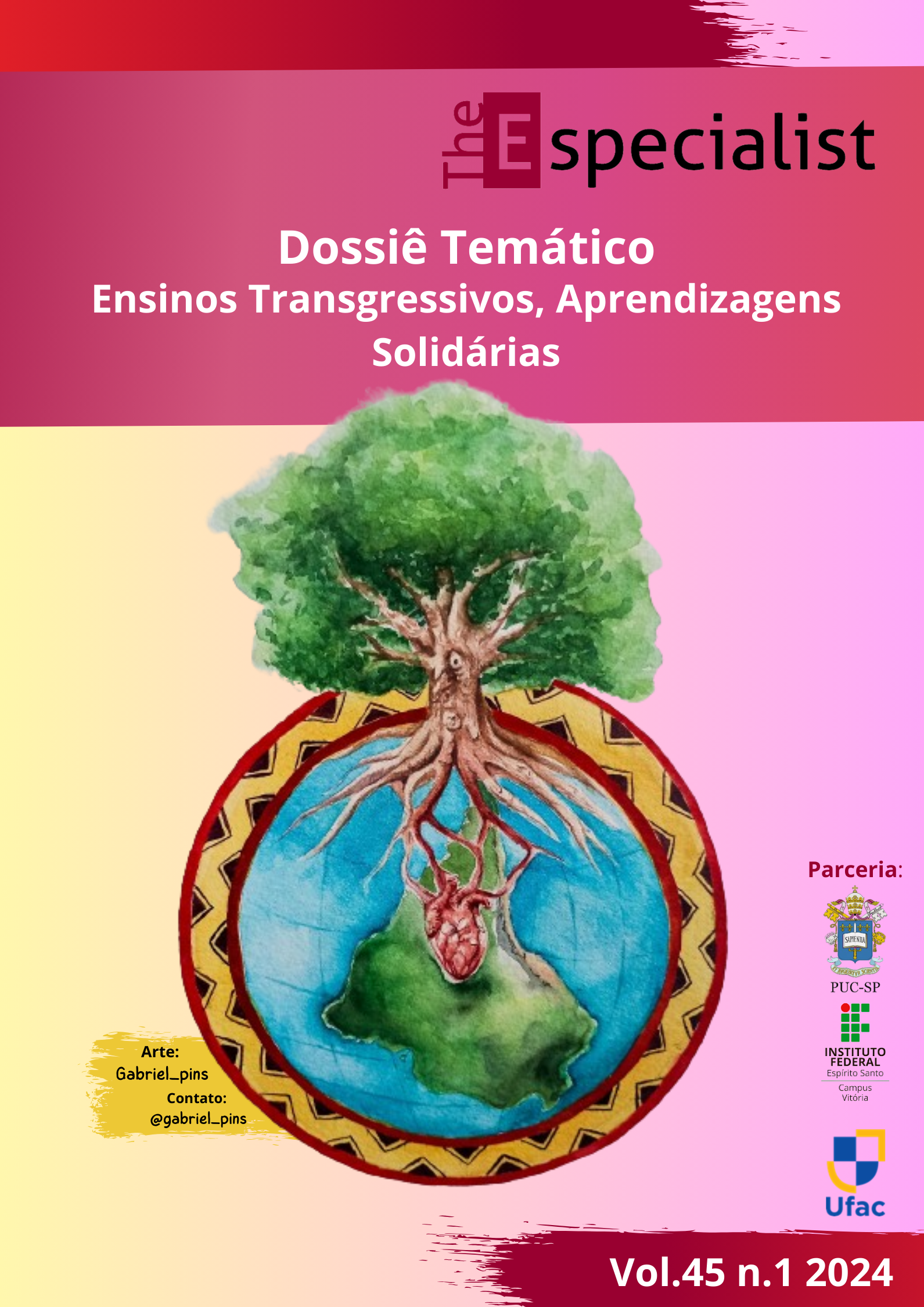Digital culture
New literacies in remixed transmedia narrative texts in transgressive Portuguese Language teaching
DOI:
https://doi.org/10.23925/2318-7115.2024v45i1e64526Keywords:
New Literacies, Transmedia Narrative, Remix, Transgressive Portuguese Language TeachingAbstract
This research falls within the field of Applied Linguistics and aims to investigate the new literacies in remixed transmedia narrative texts in Portuguese Language teaching from a transgressive viewpoint in the context of digital culture. The research has a theoretical basis in Jenkins (2006), Lankshear and Knobel (2011), Rojo and Moura (2019) and Tavares and Cruz (2016). The methodology adopts a qualitative approach, characterized as descriptive, documentary and applied, to study a corpus consisting of three media: musical album, documentary film and social network posts from the transmedia universe "AmarElo", authored by singer-songwriter Emicida. The results of the analysis of the transmedia narrative show the following remixing operations: remix, sampling, video mashup and motion graphics. It is concluded that the new literacies in remixed transmedia narrative texts can be worked in the transgressive Portuguese Language teaching, contributing to students' participation in a new mindset in digital culture.
References
AMARELO. Intérprete: Emicida. Gravadoras: Sony Music; Laboratório Fantasma. Produção de: Laboratório Fantasma; Leandro Roque; Nave. Spotify, 2019.
AMARELO (ÁLBUM). In: WIKIPÉDIA, a enciclopédia livre. Flórida: Wikimedia Foundation, 2023. Disponível em: https://pt.wikipedia.org/w/index.php?title=Amarelo_(%C3%A1lbum)&oldid=65050016. Acesso em: 6 jan. 2023.
BORTOLAZZO, Sandro Faccin. O imperativo da cultura digital: entre novas tecnologias e estudos culturais. Cadernos de Comunicação, Santa Maria, v. 20, n. 1, p. 137-151, jul. 2016. Disponível em: https://doi.org/10.5902/2316882X22133. Acesso em: 25 nov. 2022.
BRAGA, Carol. AmarELO e o universo transmídia de Emicida. Culturadoria, 2020. Disponível em:
https://culturadoria.com.br/amarelo-e-o-universo-transmidia-de-emicida. Acesso em: 10 jan. 2023.
BRASIL. Ministério da Educação. Base Nacional Comum Curricular. Brasília: MEC, 2018.
Disponível em: http://basenacionalcomum.mec.gov.br/images/BNCC_publicacao.pdf. Acesso em: 04 dez. 2022.
BRASIL. Instituto Nacional de Estudos e Pesquisas Educacionais Anísio Teixeira (INEP). Matrizes de referência de língua portuguesa e matemática do SAEB: documento de referência do ano de 2001. Brasília: INEP, 2020. Disponível em: https://download.inep.gov.br/publicacoes/institucionais/avaliacoes_e_exames_da_educacao_basica/matriz_de_referencia_de_lingua_portuguesa_e_matematica_do_saeb.pdf. Acesso em: 07 mar. 2023.
COSTA, Rosekeyla de Araújo. Letramento digital na BNCC: um estudo das competências e habilidades no componente de língua portuguesa no ensino médio. 2021. 131 f. Dissertação (Mestrado Acadêmico em Linguística Aplicada) - Programa de Pós-graduação em Linguística Aplicada, Universidade Estadual do Ceará, Fortaleza, 2021. Disponível em: https://siduece.uece.br/siduece/trabalhoAcademicoPublico.jsf?id=100778. Acesso em: 18 dez. De 2022.
EMICIDA: AMARELO - É TUDO PRA ONTEM. In: WIKIPÉDIA, a enciclopédia livre. Flórida: Wikimedia Foundation, 2023. Disponível em: https://pt.wikipedia.org/w/index.php?title=Emicida:_Amarelo_-_%C3%89_Tudo_Pra_Ontem&oldid=65917955. Acesso em: 6 jan. 2023.
EMICIDA: AMARELO – É TUDO PRA ONTEM. Direção: Fred Ouro Preto. Produção de: Evandro Fióti. Brasil: Netflix, 2020.
EMICIDA. Postagens diversas marcadas com #AmarElo, publicadas de 25 de maio a 29 de junho de 2020. Instagram: @emicida. Disponível em: https://instagram.com/emicida. Acesso em: 20 dez. 2022.
GALVÃO, Ariádina Pereira. O ensino da língua portuguesa e o letramento digital. In: Congresso Nacional de Linguística e Filologia, 19, 2015, Rio de Janeiro. Anais eletrônicos [...] Cadernos do CNFL, Rio de Janeiro, v. 19, n. 3, p. 131-148, 2015. Disponível em: http://www.filologia.org.br/xix_cnlf/cnlf/03/011.pdf. Acesso em: 02 dez. 2022.
GOSCIOLA, Vicente. Narrativa transmídia: conceituação e origens. In CAMPALANS, Carolina; RENÓ, Denis; GOSCIOLA, Vicente. Narrativas transmedia: entre teorías y prácticas. Bogotá: Editorial Universidad del Rosario, 2014.
JENKINS, Henry. Cultura da convergência. Tradução de Susana Alexandria. São Paulo: Aleph,
JENKS, Chris. Transgression. London: Routledge, 2003.
JERVIS, John. Transgressing the Modhern. Exploratitions in the Western Experience Otherness. Oxford: Blackwell, 1999.
KNOBEL, Michele; LANKSHEAR, Colin. Remix: la nueva escritura popular. Cuadernos Comillas, v.
, 2011. Disponível em: https://www.researchgate.net/profile/Michele-Knobel-2/publication/265756371_REMIX_LA_NUEVA_ESCRITURA_POPULAR/links/5467f5060cf2397f782bed40/REMIX-LA-NUEVA-ESCRITURA-POPULAR.pdf. Acesso em: 18 de dez. 2022.
LANKSHEAR, Colin; KNOBEL, Michele. Sampling “the new” in new literacies. In: KNOBEL, Michele; LANKSHEAR, Colin (ed.) A new literacies sampler. New York: Peter Lang Publishing, 2007, p. 1-24.
LEMOS, André. Ciber-cultura-remix. São Paulo, Itaú Cultural, 2005. Disponível em:
http://facom.ufba.br/ciberpesquisa/andrelemos/remix.pdf. Acesso em: 15 nov. 2022.
LESSIG, Lawrence. Remix: Making Art and Commerce Thrive in the Hybrid Economy. London: Bloomsbury Publishing PLC, 2008.
MANOVICH, Lev. Import/Export: Design Workflow and Contemporary Aesthetics. 2006. Disponível em: http://manovich.net/index.php/projects/import-export. Acesso em: 10 fev. 2023.
MARTINS, Dalton Lopes. As práticas da cultura digital. Revista do Centro de Pesquisa e Formação, Sesc, São Paulo, n. 7, p. 51-60, nov. 2018. Disponível em: https://portal.sescsp.org.br/online/revistas/edicoes/700_REVISTA+DO+CENTRO+DE+PESQUISA+E+FORMACAO+N07+ISSN+24482773. Acesso em: 25 nov. 2022.
NOGUEIRA, Susana dos Santos. BNCC: currículo utilitário-utilitarista de língua portuguesa/EM e as relações dialógicas nos discursos sobre língua(gem), gênero e o multiletramento digital. 2022. 183 f. Tese (Doutorado em Letras e Linguística) - Programa de Pós-Graduação em Letras e Linguística, Universidade Federal de Goiás, Goiânia, 2022.
PASSIANI, Enio; ARRUDA, Maria Arminda do Nascimento. Cultura. In: CATANI, Afrânio Mendes et al. Vocabulário Bourdieu. Belo Horizonte: Editora Autêntica, 2017.
PENNYCOOK, Alastair. Uma linguística aplicada transgressiva. In: MOITA LOPES, Luiz Paulo da (org.). Por uma linguística aplicada indisciplinar. São Paulo: Parábola Editorial, 2006. p. 67-84 (Lingua(gem); 19).
PEREIRA, Phillipe Halley Martins. In: Congresso Brasileiro de Ciências da Comunicação, 40., 2017, Curitiba. Anais eletrônicos [...]. Disponível em: https://www.portalintercom.org.br/anais/nacional2017/resumos/R12-1925-1.pdf. Acesso em: 25 nov. 2022.
ROJO, Roxane; MOURA, Eduardo. Letramentos, mídias, linguagens. São Paulo: Parábola, 2019. (Linguagens e Tecnologias; 7).
SANTAELLA, Lucia. Linguagens líquidas na era da mobilidade. São Paulo: Paulus, 2007.
SONVILLA-WEISS, Stefan. Mashup Culture. New York: Springer Wien, 2010.
TAVARES, Arice Cardoso; CRUZ, Dulce Márcia. O remix na produção de narrativas transmídia: nova forma de narrar na cultura da convergência. In: Congresso Nacional de Educação, 3., 2016, Natal. Anais eletrônicos [...] Campina Grande: Realize Editora, 2016. Disponível em: https://editorarealize.com.br/artigo/visualizar/21722. Acesso em: 02 dez. 2022.
WILLIAMS, Raymond. Technology and Cultural Form. Londres: Shocker Books, 1975.
Downloads
Published
How to Cite
Issue
Section
License
Copyright (c) 2024 The ESPecialist

This work is licensed under a Creative Commons Attribution 4.0 International License.
The authors grant the journal all copyrights relating to the published works. The concepts issued in signed articles are the absolute and exclusive responsibility of their authors.


 Esta obra está licenciada com uma Licença
Esta obra está licenciada com uma Licença 